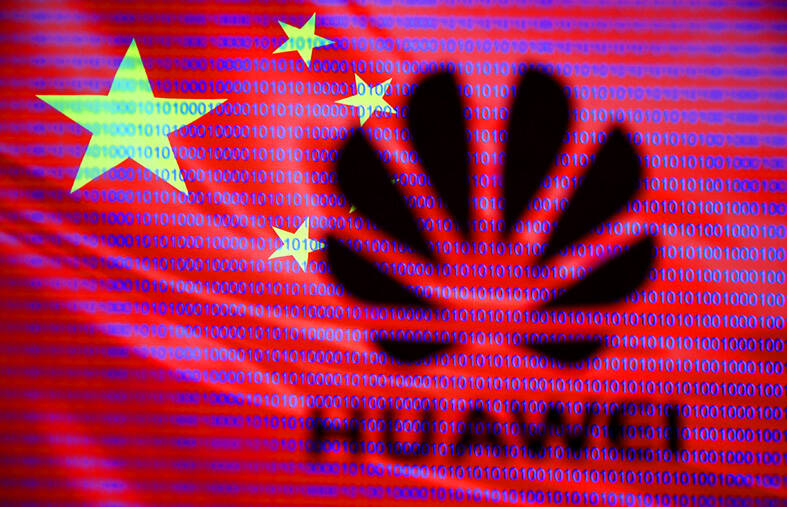Military photovoltaic projects have been found to have used Chinese-made devices blacklisted by the government, including Huawei Technologies Co routers, the Ministry of National Defense’s Armaments Bureau said on Thursday.
An ongoing investigation has identified the illegal use of 128 current transformers, two routers and a data reader at the Hungchailin Army Base, Pinghai Navy Base and Tri-Service General Hospital’s Songshan branch, it said.
The devices were manufactured in the Chinese factories of German solar energy equipment supplier SMA Solar Technology, Taiwanese electronics manufacturer Delta Electronics Co, Chinese electronics manufacturer Huawei and Taiwanese industrial PC maker Advantech Co, the bureau said.

Photo: Dado Ruvic, Reuters
The bureau’s comments follow remarks by Taiwan People’s Party Legislator Huang Kuo-chang (黃國昌), who in a news conference earlier the same day said the government has allowed its renewable initiative to become “a fifth column for Beijing,” as its national green energy team was using banned Chinese telecommunications devices in sensitive military sites.
He said the solar power projects at Hungchailin Army Base, Naval Fleet Command and National Defense University have used Chinese-made equipment.
The devices and equipment included power inverters, routers and computer control systems, he said.
The bureau said the ministry launched an investigation late last month following earlier statements by Huang about the usage of banned Chinese technology in military-run solar power projects.
Defense officials were evaluating devices in the military’s inventory, it said, adding that the numerous systems used in solar power programs complicated the task.
The probe showed that Taiwanese contractor United Renewable Energy Co and its subsidiary Yongliang Ltd installed banned Chinese-made equipment and devices at four solar power projects sites at three military facilities, the bureau said.
The ministry did not find any banned Chinese devices at National Defense University, it said.
The contractors were ordered to suspend operations and remove the Chinese-made devices, it said, adding that its legal affairs personnel and attorneys were reviewing the government’s legal options for the breach of contract.
The contractors could face fines or contract termination, it said.
Additional reporting by Huang Ching-hsuan

The first global hotel Keys Selection by the Michelin Guide includes four hotels in Taiwan, Michelin announced yesterday. All four received the “Michelin One Key,” indicating guests are to experience a “very special stay” at any of the locations as the establishments are “a true gem with personality. Service always goes the extra mile, and the hotel provides much more than others in its price range.” Of the four hotels, three are located in Taipei and one in Taichung. In Taipei, the One Key accolades were awarded to the Capella Taipei, Kimpton Da An Taipei and Mandarin Oriental Taipei. Capella Taipei was described by

EVA Airways today confirmed the death of a flight attendant on Saturday upon their return to Taiwan and said an internal investigation has been launched, as criticism mounted over a social media post accusing the airline of failing to offer sufficient employee protections. According to the post, the flight attendant complained of feeling sick on board a flight, but was unable to take sick leave or access medical care. The crew member allegedly did not receive assistance from the chief purser, who failed to heed their requests for medical attention or call an ambulance once the flight landed, the post said. As sick

Minister of Economic Affairs Kung Ming-hsin (龔明鑫) yesterday said that private-sector refiners are willing to stop buying Russian naphtha should the EU ask them to, after a group of non-governmental organizations, including the Centre for Research on Energy and Clean Air (CREA), criticized the nation’s continued business with the country. While Taiwan joined the US and its Western allies in putting broad sanctions on Russia after it invaded Ukraine in 2022, it did not explicitly ban imports of naphtha, a major hard-currency earner for Russia. While state-owned firms stopped importing Russian oil in 2023, there is no restriction on private companies to

INDUSTRY: Beijing’s latest export measures go beyond targeting the US and would likely affect any country that uses Chinese rare earths or related tech, an academic said Taiwanese industries could face significant disruption from China’s newly tightened export controls on rare earth elements, as much of Taiwan’s supply indirectly depends on Chinese materials processed in Japan, a local expert said yesterday. Kristy Hsu (徐遵慈), director of the Taiwan ASEAN Studies Center at the Chung-Hua Institution for Economic Research, said that China’s latest export measures go far beyond targeting the US and would likely affect any country that uses Chinese rare earths or related technologies. With Japan and Southeast Asian countries among those expected to be hit, Taiwan could feel the impact through its reliance on Japanese-made semi-finished products and